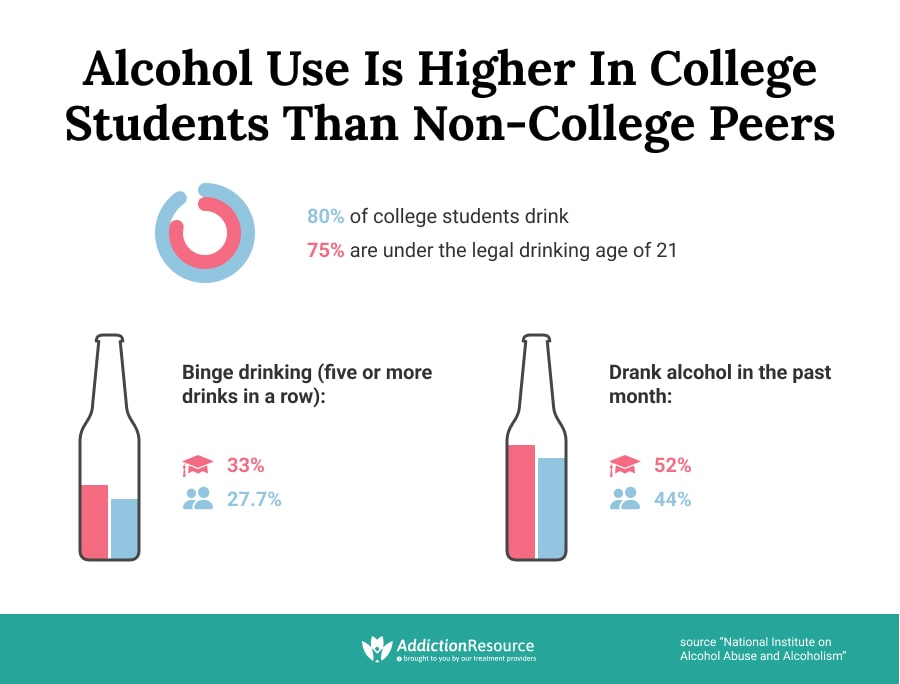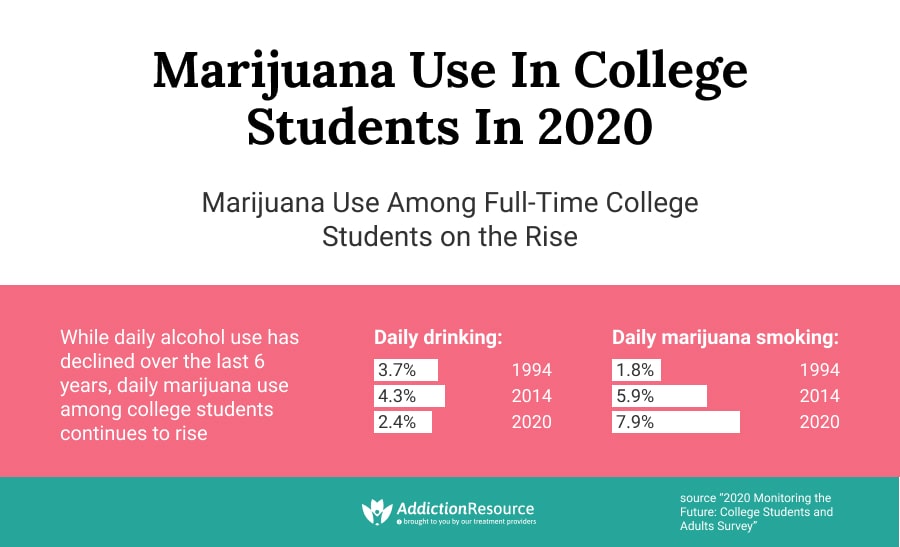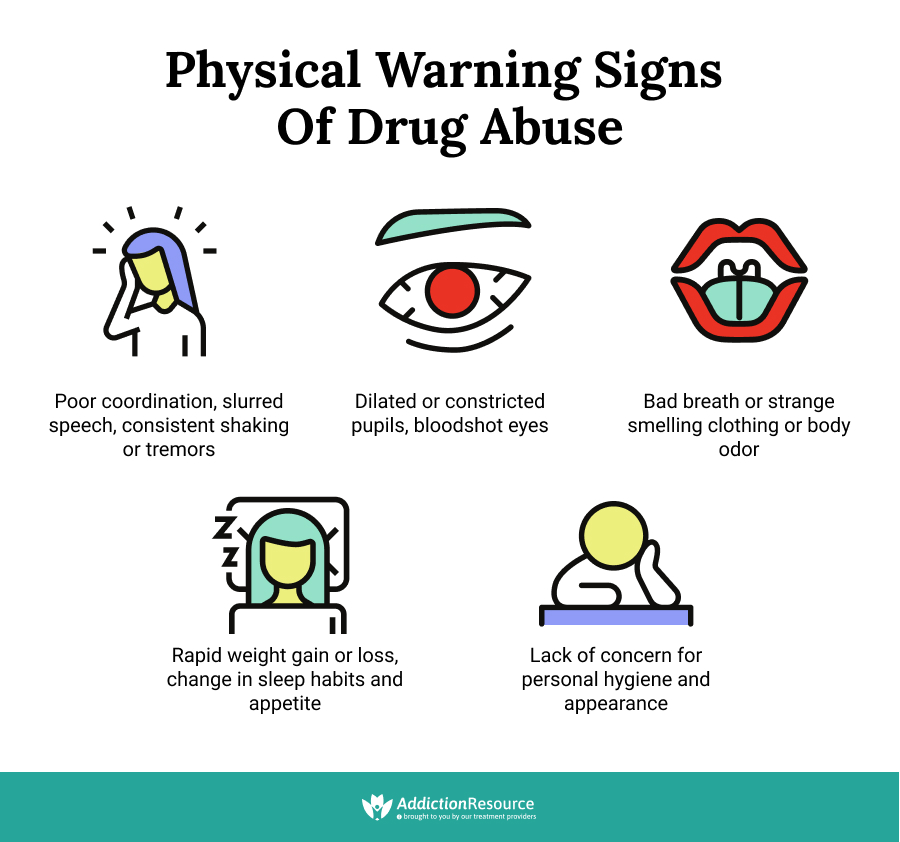College drinking has become a tradition that students mostly see as vital for their higher education experience. However, what many of the students fail to realize is that excessive drinking can cause severe health and safety problems, in addition to the possibility of addiction. Continue reading to learn why drinking in colleges happens and what are its dangers and consequences.
Table Of Contents:
- Why Does College Drinking Happen?
- What Is Binge Drinking?
- What Are The Dangers and Consequences of College Drinking?
- Which Drugs Are Commonly Abused on Campuses?
- How Greek Life and Alcoholism in College Are Connected?
- What Are Different Prevention Measures and Interventions?
- How to Recognize Substance Abuse in College Students?
- Where Can Binge Drinking College Students Get Help?

College Drinking: Why Does It Happen?
College is a time of new challenges, new responsibilities, and new experiences for many students. It can be both exciting and overwhelming at the same time, which explains why alcoholism in college is common. As per the recent National Survey on Drug Use and Health (NSDUH), 52.5% of full-time students consumed alcohol recently compared with 44% of other persons belonging to the same age group.

Certain aspects of institute life, such as the widespread availability of alcohol, unstructured time, limited interactions with family, and inconsistent underage drinking laws, can exacerbate the problem. Other reasons for alcohol abuse in college are stress, insecurity, anxiety, desire to fit in, and relationship trauma.
Binge Drinking
When it comes to binge drinking, college students sometimes come with established drinking habits, and the institute environment can worsen the problem. As per the US National Survey, every two out of three students between 18 and 22 had engaged in binge drinking lately. According to one study on underage binge drinking, college students with this habit are more likely to engage in risky behaviors, including abusing other drugs, physical violence, and earning poor grades. When continued for an extended period, frequent binge drinking can damage the liver and other body organs.
Dangers and Consequences Of Drinking on Campuses
Over 1,700 students a year die from alcohol poisoning and other alcohol-related causes. The same study also found that drinking in colleges was a factor in 100,000 rapes or sexual assaults and 700,000 other violent crimes a year. Every fourth student reports academic consequences from what seems to be alcohol abuse in college, including lower grades, missing class, falling behind, or doing poorly on tests. CASA reports that students who consumed alcohol at least three times per week were around six times more likely to fail tests than their non-drinking peers (40% vs. 7%). About 64% of drinkers missed classes compared to 12% of non-drinkers.

There is also another danger of alcohol and suicide. While in college teenagers are becoming adults, learn to take responsibility, and make decisions, it can bring some stress into their lives. When this stress is combined with alcohol or drugs, the consequences can be fatal. College drinking negatively impacts individuals, their families, and communities at large.
Here Are Some Dangers and Consequences of Drinking on Campus:
Academic Problems
Poor grades, missing classes, and increased potential for dropping out of school are issues related to substance abuse in college students. Research shows that about one in every four students reports experiencing academic problems from college drinking, such as getting behind in schoolwork.
Alcohol Use Disorder (AUD)
Almost 20% of college students meet the criteria of having alcohol use disorder. The reason why a student develops alcoholism in college also reveals how problematic its use may become. While some use it for social causes, others drink alcohol for emotional reasons, such as coping with poor academic performance or relationship trauma.
It is the latter group, according to the researchers, who may turn to alcohol for handling other mental health problems, such as PTSD, anxiety, or depression. Subjective intoxication is another factor distinguishing between people who drink excessively remain comparatively safe and others who consume less or the same amount yet suffer the consequences.
Injuries
CDC reports that excessive drinking leads to accidental injuries, such as motor-vehicle crashes, falls, and drowning.
Research shows that an estimated 599,000 students ages 18-24 get unintentional injuries under the influence of alcohol.
Assaults
According to the recent NIAAA statistics, over 695,000 students ages 18-24 are assaulted by another student who has been drinking. Researchers have confirmed a prevailing finding that one out of five coed experience sexual assault during their time in the learning center. Many sexual assaults in institutes involve alcohol or drug use in college. There is also a connection between drugs and violence.
Death
In most cases of binge drinking, college students experience several health risks and unintentional accidents. The most recent statistics estimate that over 1800 students ages 18-24 die from alcohol-related accidental injuries every year.
Drugs Commonly Abused On Campus
In addition to studying and working on the future, college is also about testing the limits for many people. Several students who did not drink in high school start drinking in colleges, and many give harder drugs a try like hallucinogens, risking the chemical dependence in their brain. Many substances are frequently used by students.
Here Are the Most Commonly Abused Drugs on Campuses:
Marijuana
After alcohol, marijuana is the most widely abused substance on college campuses. Research shows that marijuana use among US college students remains at the highest level in three decades. According to one study, the daily use of marijuana has continued to increase among students since 2015, with 8% of individuals reporting everyday use of marijuana in 2020.

Like alcohol, marijuana is now legal in many states as it is falsely considered a harmless substance. However, taking marijuana can cause serious health problems, including heart rate changes, weak immune system function, loss of coordination, compromised cognitive function, and breathing issues.
Anabolic Steroids
According to a report by the Associated Press, anabolic steroid use is rampant on campuses. More specifically, steroid abuse is an issue athletes struggle with. Drugs in sport are becoming a significant problem in college football. Steroids are administered orally or via injections. Common anabolic steroids are Sustanon, Dianabol, Anadrol, Anavar, Winstrol, Trenbolone, and Deca Durabolin.
Steroid abuse causes heart and liver damage, which is exacerbated as students using them also tend to abuse other substances. Data of the National Institutes of Health show 70% of students using anabolic steroids for non-medical reasons also meet the criteria for alcohol use disorder.
Study Drugs
So-called “study drugs” include prescription medication to treat Attention Deficit Hyperactivity Disorder (ADHD), among which Adderall and Ritalin are most widely abused. Caffeine pills, Modafinil, Artvigil, Waklert, Modalert, and Modvigil, are other common study drugs. The Journal of Addictive Diseases reports that almost two-thirds of college students with a valid prescription for ADHD medication share their supplies with students without prescriptions.
Study drugs are a way for college students to deal with academic pressure. They are believed to stimulate cognitive function, sharpen focus, and improve efficiency. Almost 81% of respondents in a CNN survey stated there wasn’t “any danger” in using these drugs as a “study aid.” A third of all college students are believed to have tried Adderall at least once. Long-term effects of Adderall abuse include physical damage to the brain, other organs, and internal systems.
Stimulants and Psychedelics
Club or party drugs like ecstasy, cocaine, and LSD have not lost their place on campuses. CASA reports that the use of cocaine on campuses increased by 52% between 1993 and 2005. Ecstasy, also known as MDMA, is a hallucinogenic derivative of methamphetamine. According to data from a Monitoring the Future study, 12.7% of college students have tried it at least once.
As with all hallucinogens, MDMA enhances sensations, acting as a stimulant, which is very appealing to college students and young people in general. It increases sexual pleasure, so risky sexual behavior is one of its most prominent (and regrettable) effects.
Checkout more about MDMA side effects.
In addition, it increases the risk of contracting a sexually transmitted infection and, even worse, an incurable virus, such as HIV.
Shrooms are also popular across campuses. Shrooms are hallucinogens that can have adverse effects, such as headaches, paranoia, intense fear, nausea (if one has too much), or anxiety. According to the Substance Abuse and Mental Health Services Administration (SAMHSA), over half a million people between the ages of 18 and 25 abused this and other types of hallucinogens in 2014, with at least three-quarters of them being in college at the time.
Antidepressants and Other Prescription Drugs
Increasing numbers of people are requesting prescription drugs without a medically legitimate reason. The erroneous perception is that these drugs help maximize academic performance with minimal risk, and students read up on the symptoms to persuade a doctor to give them a prescription.
The number of antidepressant prescriptions, for example, has increased drastically over the past ten years. It is estimated that up to 50% of US college students in counseling and health centers are on antidepressants.
Most commonly prescribed antidepressants include Zoloft, Lexapro, Paxil, Luvox, Prozac, and Cymbalta. The most extensive and comprehensive survey on prescription drug use on campus is the 2015 College Prescription Drug Study (CPDS). The survey found that every fifth college student misused prescription drugs.
The vast majority (83%) had gotten them from friends. Concerning the reasons for abuse, 85% of respondents said they were taking the medication to improve their grades or focus on schoolwork. Nearly 10% of all students who misused antidepressants reported experiencing depression as a result, which was to be expected. What the students didn’t expect, however, was that misuse of these drugs caused their grades to drop even further.

Drug Use Over Time: Then and Now
Though alcoholism in college has maintained an unvarying presence, the form and frequency of abuse of other substances have changed over the years. Today, students are taking more drugs than ever. Below is the infographic that summarizes how the prevalence of drug and alcohol abuse in college changed throughout the years.

Greek Life and Alcoholism in College
Membership of a Greek organization on campus has many social and professional benefits. It helps individuals make friends for life and develop a network of contacts. Yet, going Greek often exposes a college student to the use of a large amount of alcohol and even illicit drugs. Partying and drinking is a part of the culture at these organizations, and it is difficult for members to escape exposure to addictive substances.
Up to 80% of frat members are binge drinkers compared to only 40% of the general student population. College drinking is associated not only with academic problems but a high rate of sexual crimes, assaults, accidents, and deaths. So what makes sorority and fraternity members more likely to do drunks or binge drink?
- Group Living. Studies show that those who live on campus are more likely to become dependent on illicit substances, and the risk is even higher for those who live in Greek housing.
- Peer Pressure. Membership to frat houses comes with a great deal of social pressure to fit in and appear cool and fun.
- Lack of Supervision. Instead of resident assistants, sororities and fraternities are often led by upperclassmen who cannot keep drinking in control. Authorities tend to ignore sanctioned activities at these organizations because of the positive financial impact they have on the school.
- Initiation Rituals. Many Greek houses require an initiation ritual that may include binge drinking or some other form of risky alcohol use during the hazing.
Intervention and Prevention
Continued research has improved everyone’s understanding of how to address the persistent problem of abusive and underage college drinking. Successful efforts usually involve different prevention measures and interventions, which include the following:
Brief Alcohol Screening and Intervention of College Students (BASICS)
BASICS is a preventive intervention that aims to control alcohol consumption and its side effects, promote healthier choices among youth, and teach coping skills for risk reduction. Research has shown that BASICS reduces both alcohol consumption and negative consequences in college students.
School-based Prevention Programs
Today, school-based prevention programs are offered to students for alcohol abuse in college, which follow social influence models and involve defining norms, addressing social pressures to drink, and teaching resistance skills. Additionally, such programs offer interactive information, include peer-led components, and provide teacher training.
Family-based Prevention Programs
Parents who define and enforce rules against college drinking and check the child’s behavior greatly help in reducing the likelihood of underage college drinking. The Iowa Strengthening Families Program (ISFP), offered when students were in grade 6, is a program that has shown lasting preventive effects on alcohol consumption.
Alcohol Education
Alcohol Education (AE) program provides students with culturally-conscious and evidence-based information about using substances and harm reduction strategies. Through peer-to-peer education and involvement, this program empowers people to make wise decisions that feel right for supporting their own and community’s welfare.
Brief Motivational Interviewing
Brief Motivational Interviewing (BMI) is a motivational interview about alcohol awareness. It aims at educating students on responsible drinking, controlling alcohol-related consequences to self and others, and assisting individuals in resolving any ambivalence about their drinking habits. One study revealed that BMI students reduced alcohol-related issues to a greater extent than AE students following the intervention.
Recognizing Substance Abuse in College Students
One of the ways to tell a student is abusing prescription drugs is if they’re going for refills more often than planned or expected. It’s not as simple as that, of course – prescription drug abuse and addiction are complex issues.
We speak of prescription drug addiction when physical and psychological dependence evolves from substance abuse habits. There are ways to tell if alcohol use or other drugs has spiraled out of control.
These Are the Typical Signs:
- Binge Drinking. Binge drinking is a clear sign of alcohol abuse. One standard drink is considered 400 ml of beer, 140 ml of wine, or 40 ml of hard liquor. Binge drinking is described as four drinks or more in two hours for women and five drinks or more in two hours for men. This behavior puts one in the high-risk category. As a result of continued binge drinking, college students develop addiction in most cases.
- Change in Appearance. Rapid changes in the face, hair, and body strength indicate drug abuse. Some signs are dark circles around the eyes, sallow skin, and a pale face. An abuser will get shakes and tremors due to the chosen substance’s adverse effects on the nervous system.
- Dropping Grades. According to statistics of the NIAAA, every fourth student who goes on regular alcoholic binges will begin to exhibit poor academic performance. Students will oversleep and miss class or just not go because they’re hungover. Schoolwork suffers greatly. They do poorly on exams. It’s difficult to remember information with a mind that has become fuzzy from drug or alcohol abuse.
- Loss of Interest in Extracurricular Activities. Drug use in college makes students isolate themselves during a sober period. They might still go to class but will have no energy left for anything else later. Alcoholism in college will make students have no interest in extracurricular activities.
- Mood Swings. One who is abusing a substance will begin to experience mood swings that are decidedly out of character. This will be obvious to their family members and friends. A positive and energetic person may become negative and unresponsive if they drink or do drugs often. They will get depressed or irritable.
- Run-ins with the Law. According to federal police authorities, over 100,000 students are arrested across campuses nationwide in connection with substance abuse every year. The most common crimes are public drunkenness, DUI, and vandalism. The authorities’ statistics show that every fourth student who is a heavy drinker has committed vandalism in the past.
- A New, Negative Social Circle. Drug use in college usually makes individuals lose interest in their old friends who don’t share their newfound passion. Someone who develops a problem will often build a social circle around the party. It’s not hard for this behavior to go unnoticed, as going out every night is normal in college. If a student hangs out with people drinking in colleges or dealing with substances, he or she is probably doing it too.
- Reckless Behavior. When students start drinking in colleges, they may do harmful things they don’t remember later. The following acts and behaviors commonly signal substance abuse in college students.
The infographic below summarizes the most common signs of drug abuse.

Where Can Binge Drinking College Students Get Help?
The above warning signs may indicate a student has a drug or drinking problem and needs professional help. Addiction can lead to severe consequences, like diseases, mental health problems, etc. Substance abuse and homelessness also have a well-known connection.
Addicted students are advised to speak to a counselor or local health center staff. Contacting an expert will help prevent addiction even in the case of severe abuse.
When people realize that they need help, they are encouraged to get treatment only from a trusted drug rehab facility. These facilities’ programs often involve family members in the recovery process. Some of them include holistic therapies, like yoga for addiction recovery or pet therapy which can teach patients to overcome cravings and to deal with life stressors.
A professional counselor will explain how the treatment can be expected to affect the education process. They will work with the student to make sure they aren’t falling behind at college because this can have very negative effects, including relapse. Outpatient drug abuse centers make it possible to combine rehab and studies because the treatment program is tailored to the student’s schedule.
Hope Without Commitment
Find the best treatment options. Call our free and confidential helpline
Most private insurances accepted
Page Sources
- National Institute on Alcohol Abuse and Alcoholism, College Drinking. https://pubs.niaaa.nih.gov/publications/CollegeFactSheet/CollegeFactSheet.pdf
- National Institute on Alcohol Abuse and Alcoholism, Underage Drinking, 2006. https://pubs.niaaa.nih.gov/publications/AA67/AA67.htm
- Rimsza, M. E., & Moses, K. S. (2005). Substance abuse on the college campus. Pediatric clinics of North America, 52(1), 307–xii. https://pubmed.ncbi.nlm.nih.gov/15748936/
- Wechsler, H., Dowdall, G. W., Maenner, G., Gledhill-Hoyt, J., & Lee, H. Changes in Binge Drinking and Related Problems Among American College Students Between 1993 and 1997. https://pubmed.ncbi.nlm.nih.gov/9782661/
- Quinn, P. D., & Fromme, K. (2011). Predictors and outcomes of variability in subjective alcohol intoxication among college students: an event-level analysis across 4 years. Alcoholism, clinical and experimental research, 35(3), 484–495. https://www.ncbi.nlm.nih.gov/pmc/articles/PMC3121906/
- Hingson, R. W., Heeren, T., Zakocs, R. C., Kopstein, A., & Wechsler, H. (2002). Magnitude of alcohol-related mortality and morbidity among US college students ages 18-24. Journal of studies on alcohol, 63(2), 136-144. https://pubmed.ncbi.nlm.nih.gov/12033690/
- Muehlenhard, C. L., Peterson, Z. D., Humphreys, T. P., & Jozkowski, K. N. (2017). Evaluating the one-in-five statistic: Women’s risk of sexual assault while in college. The Journal of Sex Research, 54(4-5), 549-576. https://pubmed.ncbi.nlm.nih.gov/28375675/
- Carey, K. B., Durney, S. E., Shepardson, R. L., & Carey, M. P. (2015). Incapacitated and forcible rape of college women: prevalence across the first year. The Journal of adolescent health : official publication of the Society for Adolescent Medicine, 56(6), 678–680. https://doi.org/10.1016/j.jadohealth.2015.02.018
- Michigan News - The University of Michigan, Marijuana use among US college students remains at highest level in three decades, 2018. https://news.umich.edu/marijuana-use-among-us-college-students-remains-at-highest-level-in-three-decades/
- NIDA. 2021, September 8. Marijuana use at historic high among college-aged adults in 2020. Retrieved from https://www.drugabuse.gov/news-events/news-releases/2021/09/marijuana-use-at-historic-high-among-college-aged-adults-in-2020 on 2021, November 26
- McCabe, S. E., Brower, K. J., West, B. T., Nelson, T. F., & Wechsler, H. (2007). Trends in non-medical use of anabolic steroids by U.S. college students: results from four national surveys. Drug and alcohol dependence, 90(2-3), 243–251. https://www.ncbi.nlm.nih.gov/pmc/articles/PMC2383927/
- Arria, A. M., & DuPont, R. L. (2010). Nonmedical prescription stimulant use among college students: why we need to do something and what we need to do. Journal of addictive diseases, 29(4), 417–426. https://www.ncbi.nlm.nih.gov/pmc/articles/PMC2951617/
- National Institute on Alcohol Abuse and Alcoholism, Fall Semester—A Time for Parents To Discuss the Risks of College Drinking, 2021. https://www.niaaa.nih.gov/publications/brochures-and-fact-sheets/time-for-parents-discuss-risks-college-drinking
- Fachini, A., Aliane, P. P., Martinez, E. Z., & Furtado, E. F. (2012). Efficacy of brief alcohol screening intervention for college students (BASICS): a meta-analysis of randomized controlled trials. Substance abuse treatment, prevention, and policy, 7, 40. https://www.ncbi.nlm.nih.gov/pmc/articles/PMC3499225/
- Spoth, R. L., Redmond, C., & Shin, C. (2001). Randomized trial of brief family interventions for general populations: adolescent substance use outcomes 4 years following baseline. Journal of consulting and clinical psychology, 69(4), 627–642. https://pubmed.ncbi.nlm.nih.gov/11550729/
- Borsari, B., & Carey, K. B. (2005). Two brief alcohol interventions for mandated college students. Psychology of addictive behaviors : journal of the Society of Psychologists in Addictive Behaviors, 19(3), 296–302. https://www.ncbi.nlm.nih.gov/pmc/articles/PMC2663045/
- National Institute on Alcohol Abuse and Alcoholism, The Burden of Alcohol Use: Excessive Alcohol Consumption and Related Consequences Among College Students. https://pubs.niaaa.nih.gov/publications/arcr352/201-218.htm

